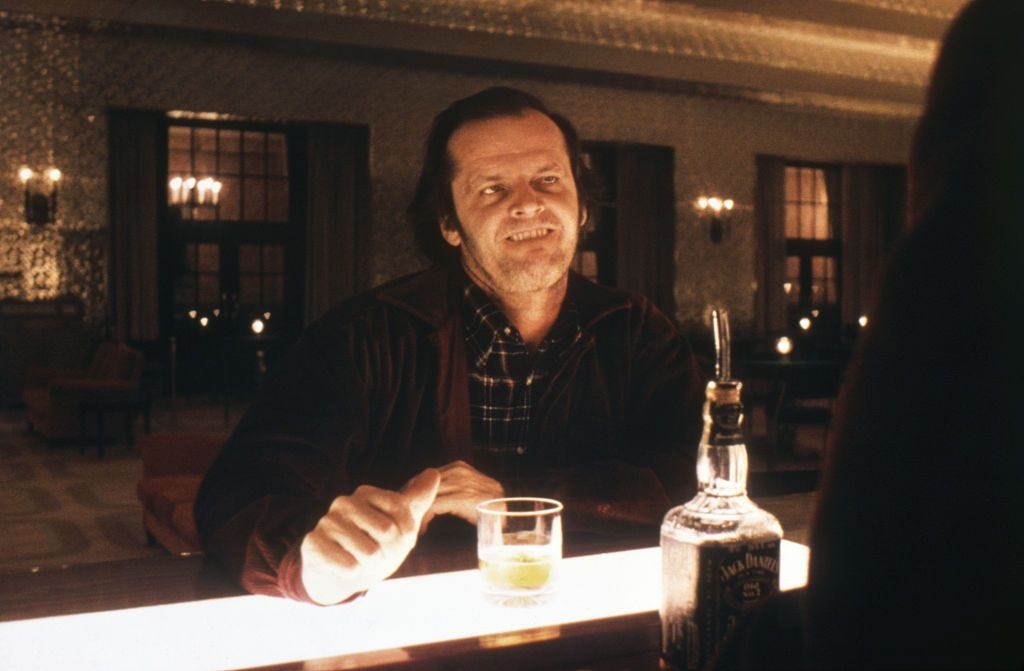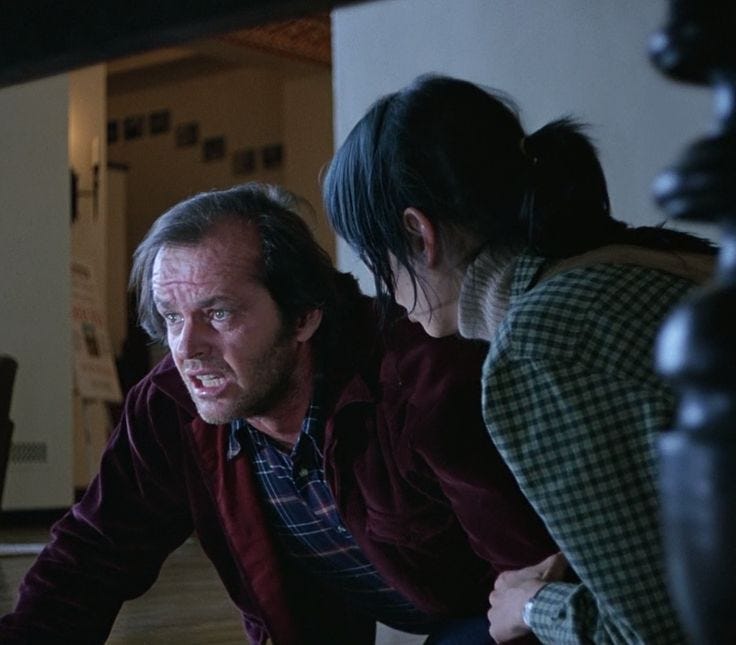The Shining (1980) - Jack Torrance & an examination of masculinity
The self-destructive patriarchy in Stanley Kubrick's "The Shining".
I remember getting beaten up by my father in a hallway some years ago. People watched and did nothing to stop him, which resulted in me screaming at everyone that they were monsters.
Monsters are real. Ghosts are too. They live inside of us, and sometimes, they win.
Stephen King, The Shining
When thinking of bad fathers, we might immediately recall Jack Torrance (Jack Nicholson) in Stanley Kubrick’s adaptation of Stephen King’s The Shining (1980). The sequence of him breaking through the door with his axe, as he attempts to murder both his wife and son, is pretty much burnt in the back of our heads.
Before that act of violence, Jack loses his job and takes a position to take care of the remote Overlook Hotel over the winter, accompanied by his wife Wendy and his son Danny. As noted in a book called Unmanned by the American Dream: Stephen King’s The Shining, Jack is soon driven by his demons. By the film’s end, he becomes deranged and determined to kill his family.
Jack Torrance reminds me of my father. There are probably many Jack Torrance’s out there in the world.
This post is to try and answer the question, why?
He fails at being the breadwinner
At the surface level, the Torrance appears to be the perfect family. However, as the story moves forward, it becomes significantly evident that each member is unhappy.
When Jack gets fired from his highly respectable job as an English professor, his family has to face financial hardship. What greater horror could we imagine than the white, middle-class, American – Jack Torrance, an unemployed English professor turned caretaker?
It is a disgrace, for sure.
The pressure that is often put on fathers as breadwinners can be extremely tough. Society will always expect that they must do all they can for their families without complaining. After losing his job, Jack starts to depend on alcohol as a form of escapism from the reality of his life.
The societal expectation is also why Jack no longer upholds these ideals and gives in to his suppressed rage at being a failure at the end of the film.
He fails at being a husband
Jack’s failure as a husband is not just shown through him chasing his wife with an axe, but through seemingly innocent dialogues. It is no coincidence that the first scene has the family driving to the Overlook with Wendy trying to initiate a conversation with Jack, but all of his responses were coldly a series of grunts and blunt answers such as ‘yes’ and ‘I know’.
He is, in modern dating terms, emotionally unavailable. 🚩
Big boys don’t cry
According to the National Institute of Mental Health, about six million American men suffer from depression every year. Various studies suggest traditional ideas of masculinity are often seen as a cause of this phenomenon. Men with depression tend to withdraw and isolate themselves while realising this response to their feelings of depression will only make them worse.
As the film progresses, Jack becomes more aggressive towards Wendy. For Jack, any distraction from his writing contributes to his anxiety about failing as a breadwinner. Jack’s hate for Wendy and feelings towards his son are all factors that eventually manifest as constant verbal abuse.
Whenever you come in here, you are distracting me and my concentration. Whenever I am in here, I am working. That means do not come in. Can you handle that? Start right now and get the **** out of here.
End
Although, while Jack may be seen as monstrous, as we dive deeper into his character, it is undeniable that the expectations upon Jack to be head of household, patriarch, father, and husband play a big part in his sanity eventually crumbling. The need to suppress in order to fulfil society’s view of what a man and father should be, influences him on becoming mentally and physically abusive towards his son and wife.
While Jack Torrance has been engraved into cultural imagination as an inherently evil figure, should he be viewed as such? Ultimately, The Shining illustrates the unrealistic expectations of society, indicting it as the main cause of masculine anxiety.







